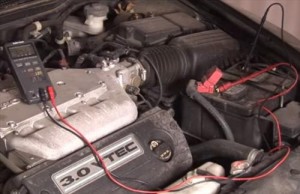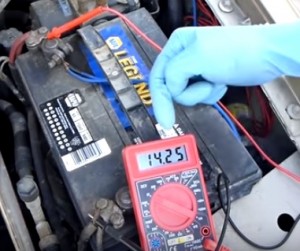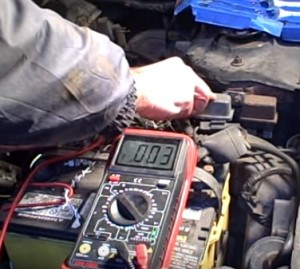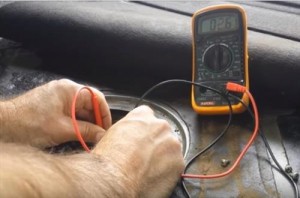
A multimeter is a tool that makes life easier when testing electronics or wiring in a vehicle.
Checking if a battery has a charge or testing the alternator are common problems that can be quickly checked with a multimeter.
A good meter for automotive work will have basic requirements that almost any meter should have.
Why is a Multimeter Used in Automotive Repair?
- Checking Voltages
- Check for Continuity (Open or Short)
- Check Resistance

A meter should be able to read voltage, mainly DC voltage since this is what a car’s electrical system runs on.
Setting a meter to DC voltage and placing the leads on the positive and negative terminals will show a battery’s charge.
When a battery is low on a charge, a battery charger can be used to give it a charge and then see if the battery is holding the charge or not.
If it does not hold a charge, then it needs to be replaced.
Another common use of a meter is to test if the alternator is working correctly. This is done by placing the leads on the battery terminals and while the car is running, watching what the voltage is.
Most vehicles idle at around 14 volts which would indicate the alternator is good.

Continuity is simply testing if there is a break in a circuit or wire.
For example, a fuse can be tested by putting the leads on both legs of the fuse. The meter will stay at zero if it is bad; if it is good, then it will show a number higher than 1.
A good multimeter will beep while doing a continuity test which can help greatly in hard-to-reach components.
A break in the wiring can also be checked to see if there is a bad inline fuse or a wire simply has a break in it.

Resistance is testing how much an electrical current is being blocked from flowing through a circuit or wire.
Measuring resistance is not used a lot in automotive repair but is still used in certain cases.
For example, some fuel pumps can be tested for resistance to see if it is good or bad.
If the resistance does not fall within a certain range and is too high or too low, it indicates that the pump’s fuel is bad.
So what are some good multimeters for automotive repair?
There are many units available, with some of our favorite picks below.
As always, be sure to read the reviews on Amazon or elsewhere to be sure a unit is a good fit for you.
*This site contains affiliate paid links for which a commission earned.
Our Picks for Best Multimeters for Automotive Repair
- INNOVA 3340
- Etekcity MSR-C600
- Fluke 115
- HOLDPEAK 90BS
The INNOVA 3340 is a meter built for automotive repair with a lot of features.
Features include a temperature probe and an inductive RPM clamp.
It is a good unit for a DIY mechanic able to do all the necessary readings such as DC volts, current, resistance, and temperature.
The lettering has large print making it easy to read the options.
The display is 2.75 inches wide with a clear easy to read screen along with read-outs for the setting it is on, such as DC or AC voltage.
The Etekcity MSR-C600 is a good meter for those on a budget.
Most DIY jobs don’t require an expensive meter, and a low-cost unit will do most things required.
The amp clamp on the Etekcity MSR-C600 is a nice feature that lets you see what amps are being pulled by simply placing the clamps around a wire with AC voltage.
The Fluke 115 is a high-end meter that is over-kill for most auto repair problems.
It is built for durability and accuracy and is mainly used in HVAC, where accuracy is important.
For those who want a quality top-end meter, then this is a good one to get.
The HoldPeak HP-90series is a good mid-range meter.
If you don’t want a cheap meter but don’t exactly want a high-dollar unit, this one is a nice compromise between the two.
Summary
A good multimeter can help fix many issues when troubleshooting car or truck problems.
Almost any meter can be used in automotive repair as long as it takes accurate measurements and is well-built.
Getting a low-cost unit is always an option; just remember they are not built for lots of use, and the buttons will start to go bad when used a lot.
Low-cost units are good for the occasional use, while better mid to high-range units are best if it is to be used a lot.
Do you have a good multimeter that works well with an automotive repair? Let us know your thoughts below.
I recently purchased a Finest 516 Automotive Multimeter and can’t seem to find any info.. Are these any good? I only paid $50 .